Decarbonization News
MarineShift360 Unveils First Impact Accelerator Cohort
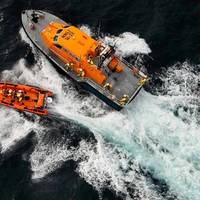
MarineShift360 has unveiled the first cohort of its Impact Accelerator Program, selecting three pioneering organizations to advance sustainability across the marine industry.Following a competitive selection process, the Royal National Lifeboat Institution (RNLI, United Kingdom and Ireland), Secfuel (Sweden), and BAR Technologies (United Kingdom) were chosen for their potential to drive measurable environmental impact and accelerate industry-wide transformation.Each participant will receive tailored technical support…
Wärtsilä Introduces CCS Solution for Maritime Industry
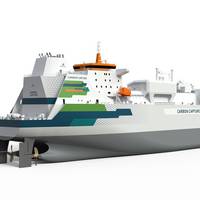
Technology group Wärtsilä has made its carbon capture solution (CCS) commercially available to the global maritime industry, aimed at accelerating the decarbonization of shipping.According to Wärtsilä’s tests, the new ‘Wärtsilä Carbon capture solution’ is proven to reduce vessel CO2 emissions by up to 70%, providing ship owners with an immediate solution to meet increasingly stringent environmental regulations.The ability to capture CO2 from ship exhaust systems will have a major impact on the industry’s efforts to reduce GHG emissions…
HD Hyundai and Maersk Cooperate on Decarbonization and Logistics
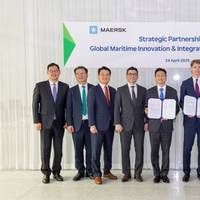
HD Hyundai and A.P. Moller - Maersk have signed an Memorandum of Understanding (MoU) to establish a collaboration on decarbonization solutions for vessels, while HD Hyundai plans to expand the use of Maersk’s integrated logistics services across its affiliates.Since 2021, HD Hyundai has received orders for a total of 19 methanol-powered container ships from Maersk. Last year, the company successfully delivered the world’s first methanol-powered ultra-large container ship, continuing its collaboration with Maersk in the field of decarbonization of shipbuilding and shipping industry.Initially…
TotalEnergies, OQEP Start Construction of Marsa LNG Plant in Oman
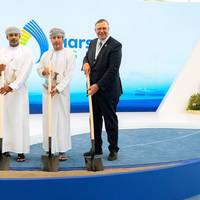
French energy giant TotalEnergies and OQ Exploration and Production (OQEP), Oman's national oil company, have held the ground breaking ceremony for the Marsa LNG plant, marking the start of construction of the Marsa LNG plant in the port of Sohar, northern Oman.The ground breaking ceremony was held one year after the Final Investment Decision (FID) for the project, which will feature a liquefied natural gas (LNG) plant completely powered by renewable energy that will produce LNG…
INEOS Set for May Launch of First European Built CO2 Carrier
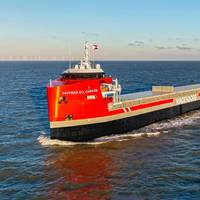
The first European built CO2 carrier, dedicated for work at the Greensand carbon capture and storage (CCS) project, will be christened and launched on May 14, 2025.All ship sections of the vessel have now been successfully constructed and assembled at Royal Niestern Sander shipyard in the north of the Netherlands.The dedicated CO2 carrier currently under construction at Royal Niestern Sander shipyard in the Netherlands is a cornerstone in Greensand’s mission to deliver EU’s first…
Wind and Biofuel Power Odfjell’s First Near Carbon-Neutral Transatlantic Voyage
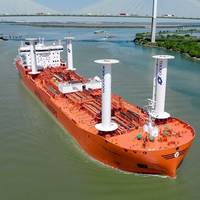
Odfjell’s chemical tanker Bow Olympus is currently crossing the Atlantic powered by a combination of wind-assisted propulsion and a certified sustainable 100% biofuel, marking the company’s first near carbon-neutral transatlantic voyage.Real-time data from the voyage confirms that the dual propulsion approach is both technically feasible and impactful, as the vessel’s GHG emissions on the current voyage meet the 2050 Fuel EU Maritime GHG intensity targets and IMO’s GFI Direct…
COAST, University of Victoria Join to Launch the BC Marine Energy and Decarbonization Hub
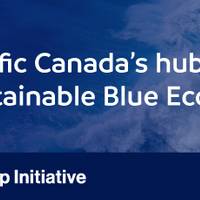
In a stride for the Canadian clean energy transition, two leaders in British Columbia’s ocean innovation sector have announced a joint initiative that forges brand new pathways for the development and commercialization of marine renewable energy and decarbonization technologies in British Columbia.The BC Marine Energy and Decarbonization Hub is a core initiative of COAST, Pacific Canada’s hub for the sustainable blue economy, delivered in partnership with the University of Victoria.
China's First Offshore Hydrogen-Ammonia-Methanol Platform Starts Operating
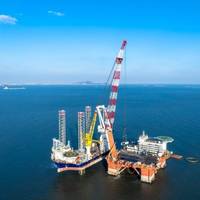
China's first integrated offshore hydrogen-ammonia-methanol project, which will produce clean fuels for ships, has entered the trial operation phase in Yantai, in eastern Chinse province of Shandong.Jointly developed by CHN Energy Hydrogen Energy Technology, CIMC Raffles and Guoneng Hydrogen Innovation Technology (Beijing), the initiative represents the nation’s first comprehensive demonstration project for offshore hydrogen production, storage, transportation and utilization…
MHI, SBM to Study Application of CO2 Capture Modules for Petrobras’ FPSOs
Mitsubishi Heavy Industries (MHI) and Single Buoy Moorings, the subsidiary of SBM Offshore, have agreed to conduct a study for the application of CO2 capture modules on future floating production storage and offloading vessels (FPSOs) for Petrobras.This study will be conducted toward typical implementation of CO2 capture solutions for FPSOs.The module design for FPSOs is based on a combination of MHI's proprietary Advanced KM CDR Process CO2 capture technology and SBM's Fast4Ward principles.The study will focus on capture of the CO2 emitted by onboard gas turbines…
Svitzer, Wallenius Wilhelmsen Sign EcoTow Agreement to Drive Decarbonization
Svitzer has signed a global EcoTow agreement with the Wallenius Wilhelmsen group. The agreement marks a step in Svitzer’s decarbonization journey and supports Wallenius Wilhelmsen’s ambition to reduce Scope 3 emissions across Svitzer’s global operations.The agreement covers tug jobs across key markets such as Australia, the UK, and Scandinavia. By applying the mass balance principle, Svitzer can use biofuels across its network and bank the resulting CO₂ savings in its emissions ledger.
ClassNK Greenlights Mitsubishi’s CCS System Onboard Ships
ClassNK has issued an approval in principle (AiP) for an Onboard Carbon Capture and Storage system (OCCS) developed by Mitsubishi Shipbuilding.The certification confirms its feasibility from regulatory and safety perspectives.Interest in CO2 capture the method from exhaust gases is growing alongside fuel conversion as part of efforts to reduce GHG emissions from ships.In response, the development of OCCS is progressing. To support the smooth development and introduction of related technologies…
US Withdraws From Carbon Talks on Shipping, Urges Others to Follow
The United States has withdrawn from talks in London looking at advancing decarbonisation in the shipping sector and Washington will consider "reciprocal measures" to offset any fees charged to U.S. ships, a diplomatic note said.Delegates are at the UN shipping agency's headquarters this week for negotiations over decarbonisation measures aimed at enabling the global shipping industry to reach net zero by "around 2050".An initial proposal by a bloc of countries including the European Union, which was submitted to the UN's International Maritime Organization (IMO), had sought to reach agreement for the world’s first carbon levy for shipping on greenhouse gas (GHG) emissions."The U.S.
US Threatens IMO with Tariffs
The Trump administration has pulled out of the decarbonization negotiations taking place at the IMO’s Marine Environment Protection Committee (MEPC) 83rd session this week.The US government is threatening reciprocal measures if any fees are imposed on US vessels based on GHG emissions or fuel choices.The 2023 IMO GHG Strategy outlines a set of “mid-term measures” aimed at reducing greenhouse gas emissions from international shipping. These measures should consist of:• a technical element: a goal-based marine fuel standard designed to gradually lower the GHG intensity of marine fuels…
HEMEXPO Joins Decarbonization Project
The marine equipment manufacturers and exporters association for the international shipping industry, HEXEMPO, has joined the EU Horizon Innovation Action project entitled “Sustainable Emission Abatement Strategies & Technologies for Advanced Revolution Ships” (SEASTARS).The initiative aims to achieve a minimum 30% reduction in well-to-wake greenhouse gas (GHG) emissions by 2030 (compared to 2008 levels) and a 20% increase in energy efficiency (compared to 2022).With EU and global regulators expanding the scope of mandatory measures to drive maritime decarbonization…
bound4blue Installs ‘Largest Ever’ Suction Sails on LDC’s Juice Carrier
Spanish wind propulsion system supplier bound4blue has installed ‘world’s largest’ suction sails onboard the juice carrier MV Atlantic Orchard, chartered by Louis Dreyfus Company (LDC) and owned by Wisby Tankers.The four bound4blue’s 26-meter high eSAILS were installed in under a day per unit, as planned. When sailing, the 2014-built vessel, which was originally a dry bulk vessel before undergoing a conversion in 2020, will now enjoy simplified FuelEU Maritime compliance, taking advantage of the Wind Reward Factor…
NYK Concludes First Demo of Ammonia-Fueled Tugboat for Commercial Use
The world’s first commercial-use ammonia-fueled vessel, Sakigake, has completed a three-month demonstration voyage, achieving a GHG-emission reduction of up to approximately 95%.The vessel was completed by Nippon Yusen Kabushiki Kaisha (NYK) and IHI Power Systems (IPS) on August 23, 2024, in cooperation with Nippon Kaiji Kyokai (ClassNK) as part of a Green Innovation Fund Project under Japan’s New Energy and Industrial Technology Development Organization (NEDO).The development project of this vessel started in October 2021 and completed in August 2024…
Wind Propulsion Key to Cut Shipping Costs and Carbon, According to Report
As the International Maritime Organization (IMO) prepares to meet in London from March 31 to April 11 to finalize measures for its greenhouse gas (GHG) strategy, a new report by marine NGO Seas At Risk shows the economic and climate benefits of using wind-assisted propulsion to power global shipping.The ‘Wind First!’ study shows that retrofitting sails on large, existing vessels can save close to half a million U.S. dollars on fuel costs and reduce fuel consumption and carbon emissions by up to 12%…
Singapore and India Partner on Maritime Digitalization and Decarbonization
Singapore and India have signed a Letter of Intent (LOI) to cooperate on maritime digitalization and decarbonization.The LOI was inked by Teo Eng Dih, Chief Executive of the Maritime and Port Authority of Singapore, and R. Lakshmanan, Joint Secretary of the Ministry of Ports, Shipping and Waterways (MOPSW) of India.The parties will collaborate on maritime digitalization and decarbonization projects, including identifying relevant stakeholders who could contribute to the effort…
Batteries Use in Vessels - Current Situation, Future Prospects
On the current pathway, global shipping greenhouse gas (GHG) emissions are forecast to rise in this decade and eventually return to 2010 levels by ~2050.The chart represents the three scenarios for shipping emissions developed by the International Energy Agency (IEA) and adds in the IMO Strategy targets for emissions reduction. The IEA’s aspirational case (i.e. what governments and companies aspire to do rather than are actually doing – that is the current pathway) closely mirrors the IMO’s 2023 updated strategic direction.
AET, Fleetzero Team Up for ‘World’s Longest-Range’ Hybrid-Electric Vessel
AET, a member of the MISC Group and owner and operator of maritime transportation assets, has signed an agreement with Fleetzero, a supplier of modular marine batteries for hybrid and electric ships, for the development of the world’s longest-range plug-in hybrid-electric vessel.Under the agreement, one of AET's Lightering Support Vessels (LSV) will be retrofitted with a plug-in hybrid-electric system.The vessel will operate primarily on battery power, reducing greenhouse gas…
Kongsberg Embarks on Hybrid Conversion of Swedish Operator’s Ferry
Kongsberg Maritime has secured a project to convert the double ended car ferry MF Hamlet to emission-free battery powered operation.The ferry, operated by Öresundlinjen, on the route between Helsingør, Denmark, and Helsingborg, Sweden, will see a major upgrade including installation of large battery packs and new permanent magnet motors for the azimuth thrusters.The primary goals of the project include achieving zero emissions, enabling full electric operation with batteries, and having mechanical propulsion redundancy.The ferry will utilize high-voltage charging in port…
Hapag-Lloyd taps StormGeo on Path to Cut Vessel Emissions
As the shipping industry pushes toward decarbonization, Hapag-Lloyd is leveraging StormGeo’s digital solutions to ensure compliance with the new FuelEU Maritime regulation. The regulation, which took effect on January 1, 2025, requires shipping companies to reduce greenhouse gas emissions by increasing the use of sustainable fuels.With a fleet of 300 container ships, Hapag-Lloyd has already made significant strides in sustainability, operating LNG dual-fuel vessels and using biofuels capable of cutting emissions by up to 80%.
Fortescue’s Ammonia-Powered Vessel Arrives to UK
The Singapore-flagged dual-fuel ammonia-powered vessel Fortescue Green Pioneer has arrived in the U.K. to demonstrate the viability of ammonia as a sustainable marine fuel.The vessel is the first of its kind, powered by four-stroke engines, two of which are capable of being fueled by ammonia and diesel.Ammonia, a zero-carbon fuel, has the potential to substantially reduce greenhouse gas emissions when used for shipping.An ammonia-powered vessel exemplifies how shipping can become more sustainable, an ambitious but essential mission fully backed by U.K.
